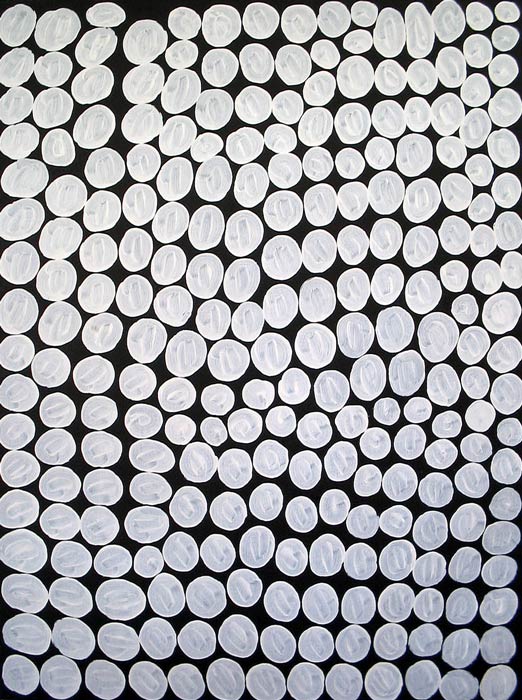Dr. George TJAMPU (WARD) TJAPALTJARRI - Tingari Cycle
ADG: 2190
DescriptionStory of Painting - Tingari Cycle
During the creation era, the Tingari Ancestors gathered at a series of sites for Initiation Ceremonies. They travelled across the country, performing rituals at specific sites, creating the natural features of the landscape. These creation stories and rituals are still portrayed in song cycles, paintings and ceremonies, and are part of the continuous teaching to the next generation.
In painting Tingari stories, the artist is retelling the Song Cycle associated with the artist's many ancestral dreaming sites, and the locations of these significant natural sites in the Gibson Desert.
Dr. George TJAMPU (WARD) TJAPALTJARRI - Biography
Born c.1935-
Language Pintupi
Country Jupiter Well Country, Gibson Desert, WA
Community Kintore, NT
Outstation Kilingya, west of Jupiter Well, and Karinyarra, west of Kintore, NT
Subjects Tingari Cycle, Puli
Doctor George Tjampu (Ward) Tjapaltjarri was born southwest of Jupiter Well in the Gibson Desert, Western Australia, emerging from the desert in 1964, where he had led the traditional nomadic life. The title ''Doctor'' refers to his position as a traditional medicine man of his people. His traditional country includes Karrinwara, west of Kintore, and Kilingya in Wenampa located to the west of Jupiter Well. He is recognised amongst his tribe as an Aboriginal Doctor and is also attached to the Kintore and Tjukula Health Clinics. He is a powerful Maparn or traditional healer, renowned for his "laying on of hands" and commands complete respect.
As well as being a medicine man, Doctor George is an important Pintupi elder responsible for the initiation of young men. This responsibility entails revealing to them the esoteric knowledge connected with the ‘Tingari Cycle’. Bold series of horizontal and vertical lines represent ceremonial body paint designs are painted on young men during Malliera initiation ceremonies. The body paint designs appear to imply a strong association with the desert landscape, its soakages, sandhills and creek beds. These raw body paint markings emulate the tradition and power of the sacred story they are connected to.
Doctor George is a Pintupi elder, responsible for the initiation of young men into the traditional life, and revealing to them the esoteric knowledge connected to the Tingari Cycle. Dr. George's style has become quite innovative in recent years, and his confident hand is evident in the assurance of his paintings. Very sadly, Doctor George is going blind and is no longer painting.
Selected Collections
National Gallery of Victoria, Melbourne
Museum and Art Gallery of the Northern Territory, Darwin
Selected Exhibitions
1989 Mythscapes, Aboriginal Art of the Desert, National Gallery of Victoria, Melbourne
2000 Performing Arts Centre, Darwin NT
Ranking Most Important Australian Indigenous Artists (both living and deceased)
2011 Ranked 180/200

